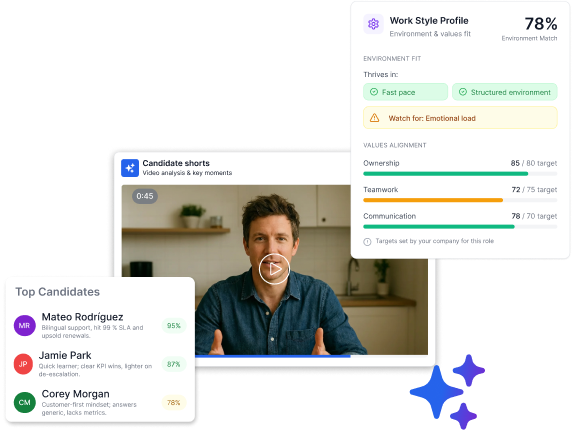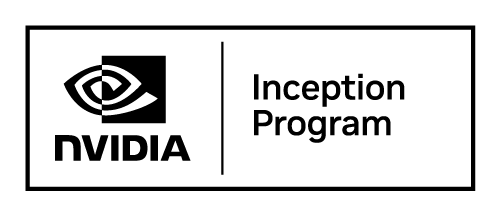You don't need another "modern" tool while you're drowning in resumes and juggling calendars. You need video interview software that takes a noisy applicant pool and helps you figure out who's worth talking to fast. This guide covers one-way vs. live interviews, what "async" actually means, how ATS integrations really work, a 2026 vendor shortlist with real tradeoffs, and a decision framework you can use this week.
What to look for in video interview software
Before you compare platforms, know what actually matters for how your team hires. Most feature lists are long on buzzwords and short on workflow impact. These are the capabilities that separate tools you'll use from tools you'll abandon in a month.
- Async and live support. Most teams need async for first-round screening and live for final rounds. Some platforms do both; others specialize. Match the format to your actual bottleneck — if phone screens are killing you, async matters more than live panel features.
- Structured evaluation. Built-in rubrics, scorecards, and anchored rating scales so every reviewer applies the same standards. Without this, you're just collecting videos in a folder. The best video interview software makes comparison easy, not just collection.
- AI that supports your review — not replaces it. Transcription, summaries, and match scoring that help you review faster. Look for reasoning behind every score so you can evaluate the AI's work, not just trust it. Avoid platforms where AI is a black box.
- ATS integration that actually syncs. "Integrates with Greenhouse" can mean real-time bi-directional sync or a pasted link. You need invite triggers, completion status updates, results write-back, and disposition sync. If the vendor can't demo the full loop for your ATS, expect manual work.
- Candidate experience. Mobile-first, browser-based (no app downloads), clear instructions, reasonable time limits, and prep time before recording. A clunky candidate experience tanks your completion rate — and your employer brand.
- Setup speed. How long from sign-up to a live job with real candidates? Self-serve tools can get you there in minutes. Enterprise platforms may take weeks. Know which lane you're in.
- Pricing transparency. Can you find the price without a sales call? Do you know what's included at your tier and what costs extra? Surprises at contract time are a red flag.
Two video interview tool formats, one decision
One-way (asynchronous): Candidates record answers to structured questions on their own schedule. Your team reviews in batches — transcripts, summaries, and scores instead of live calls. Best for high-volume screening where phone screens are the bottleneck.
Live: Real-time video with back-and-forth conversation, built-in notes, and structured scoring. Best for final rounds, technical deep-dives, stakeholder alignment, and closing.
Most teams need both. Use async to narrow the field, then live to go deep with the candidates who earned a real conversation.
Why it's not just Zoom or Teams
Video interview software adds structure (same questions for every candidate), scoring (built-in rubrics for consistent comparison), and workflow (invites, reminders, audit trails, and ATS handoffs). Zoom helps you meet. This helps you screen and decide.
One-way vs. live: When to use each?
Here's when to use live or async interviews.
One-way (async) interviews
Candidates get a link, record answers to 3–6 questions with time limits, and submit. Your team reviews on your schedule and not theirs.
This is where teams reclaim the most time. Instead of scheduling and sitting through calls to find out someone can't work weekends, you review a transcript in a couple of minutes and move on.
Best for: hourly roles, customer support, sales development, healthcare staffing, franchise hiring, seasonal spikes. It's anywhere phone screens have become calendar Tetris.
Live interviews
Synchronous, typically 30–60 minutes. Panels may run longer for leadership roles.
Use live when you need real interaction: final rounds, technical deep-dives, role plays, stakeholder conversations, and closing. It captures nuance you can't get asynchronously — collaboration style, reasoning under pressure, how someone handles follow-up questions.
The hybrid approach that works
Async to shortlist, live to decide.
Screen with 4–5 structured questions mapped to your rubric. Review transcripts, summaries, and scores to identify who's aligned. Then run live interviews only with candidates who've already demonstrated they're worth your time.
Go heavier on async when you have high volume, lean recruiting capacity, or multiple locations. Go heavier on live for high-ambiguity roles, on-the-fly problem solving, or leadership hires.
2026 video interview software vendor shortlist
We reviewed platforms across SMB and enterprise use cases, testing end-to-end flows (invite → candidate experience → review → collaboration → ATS handoff) and common edge cases (mobile completion, slow connections, multiple reviewers, high-volume batches).
Each tool was evaluated on ATS integration quality, AI capabilities, candidate UX, pricing transparency, setup time, and team fit. Pricing changes often — verify with the vendor before you commit.
The order reflects best overall fit for lean TA teams, staffing agencies, and fast-moving HR teams that need structured screening without enterprise overhead. Enterprise environments with strict procurement and global compliance may need a different shortlist.
1. Truffle
Best for: Lean TA teams, SMBs, and staffing agencies doing high-volume screening who want fast, structured decisions without enterprise complexity.
What it does: AI-generated one-way interviews from your job description. Transcripts, summaries, match scores with reasoning, instant qualification checks, and 30-second Candidate Shorts highlight reels. Candidates complete on any device — one link, no downloads.
Pricing: $99/month annual, $129/month month-to-month. Unlimited users. Free 7-day trial, no credit card.
ATS: Native integrations plus Zapier and API. Auto-invites at stage change, writeback of transcripts and scores.
Setup: 10–15 minutes for a live job.
Tradeoffs: Focused on async screening. If you need complex live panels and scheduling, pair with a broader suite.
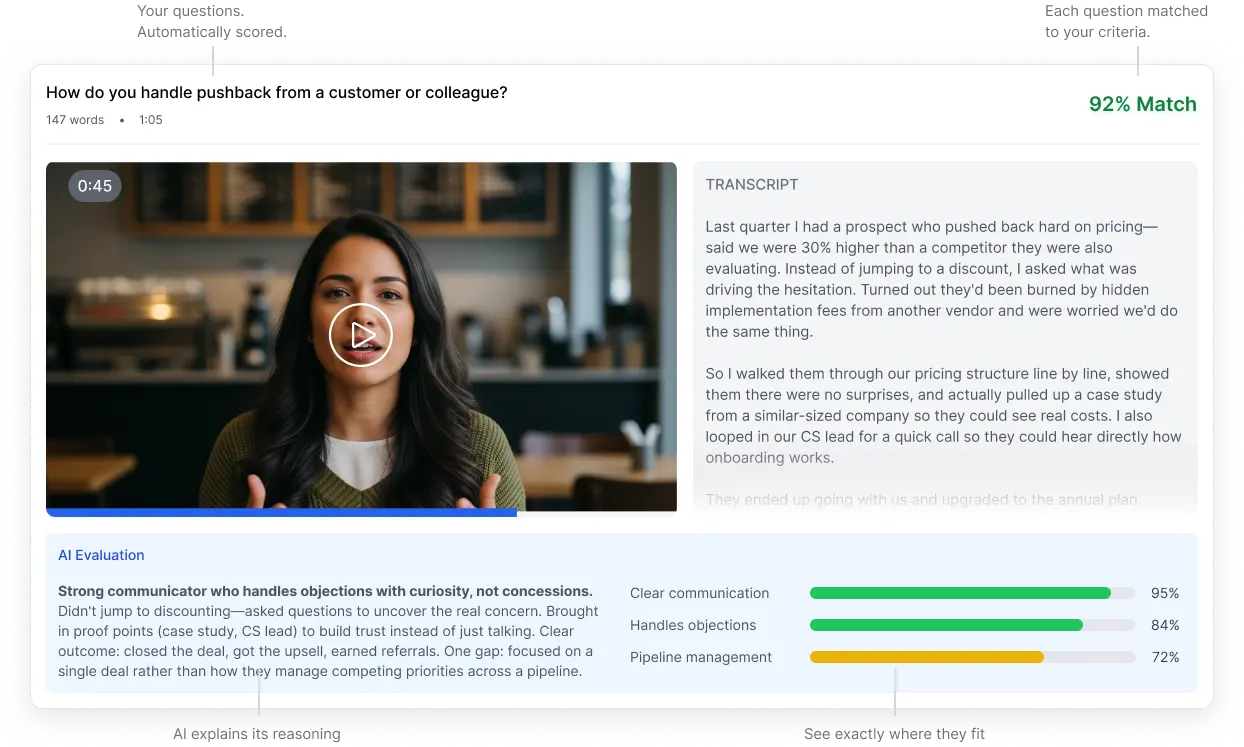
2. Spark Hire
Best for: SMB and mid-market teams wanting straightforward one-way and live interviews in one tool.
What it does: One-way invites, live interviewing, team ratings and comments, recruiter-led workflows.
Pricing: Subscription tiers; varies by seats and usage.
ATS: Often via partner connectors — verify true sync vs. link-only workflow for your specific ATS.
Setup: 1–3 days; faster without ATS sync.
Tradeoffs: Balanced live and async. AI depth and integration quality vary by plan.

3. HireVue
Best for: Enterprise TA running global, high-volume hiring with strict compliance requirements.
What it does: On-demand interviewing, integrated assessments, workflow controls, and large-program administration across regions and business units.
Pricing: Quote-based enterprise packages. Plan for professional services, multi-region rollout, and compliance workstreams in your TCO.
ATS: Supports major enterprise ATS/HCM via native or partner connectors — define scope in writing during procurement.
Setup: 4–12 weeks depending on integrations, SSO, and compliance review.
Tradeoffs: Scales globally with strong governance. Heavier implementation; overkill for lean teams.
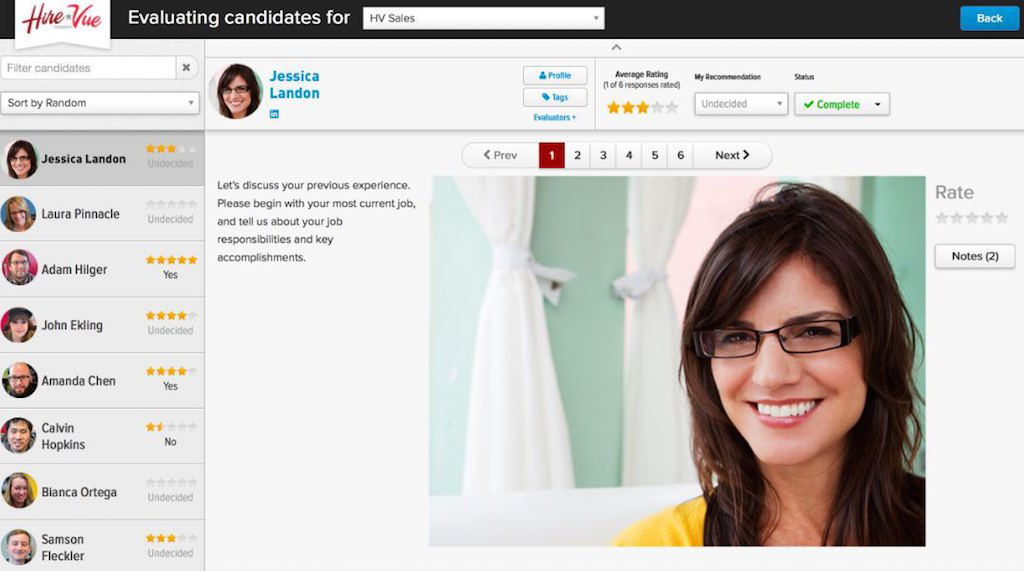
4. VidCruiter
Best for: Mid-market to enterprise teams needing configurable workflows and control over structured evaluation across departments.
What it does: Configurable multi-stage workflows, standardized evaluation, and modular feature set.
Pricing: Quote-based; depends on modules, volume, and integrations.
ATS: Often sold with integration support — verify bi-directional sync vs. exports for your ATS.
Setup: 2–6 weeks depending on complexity.
Tradeoffs: Strong for repeatable, auditable processes. More configuration than lightweight tools.
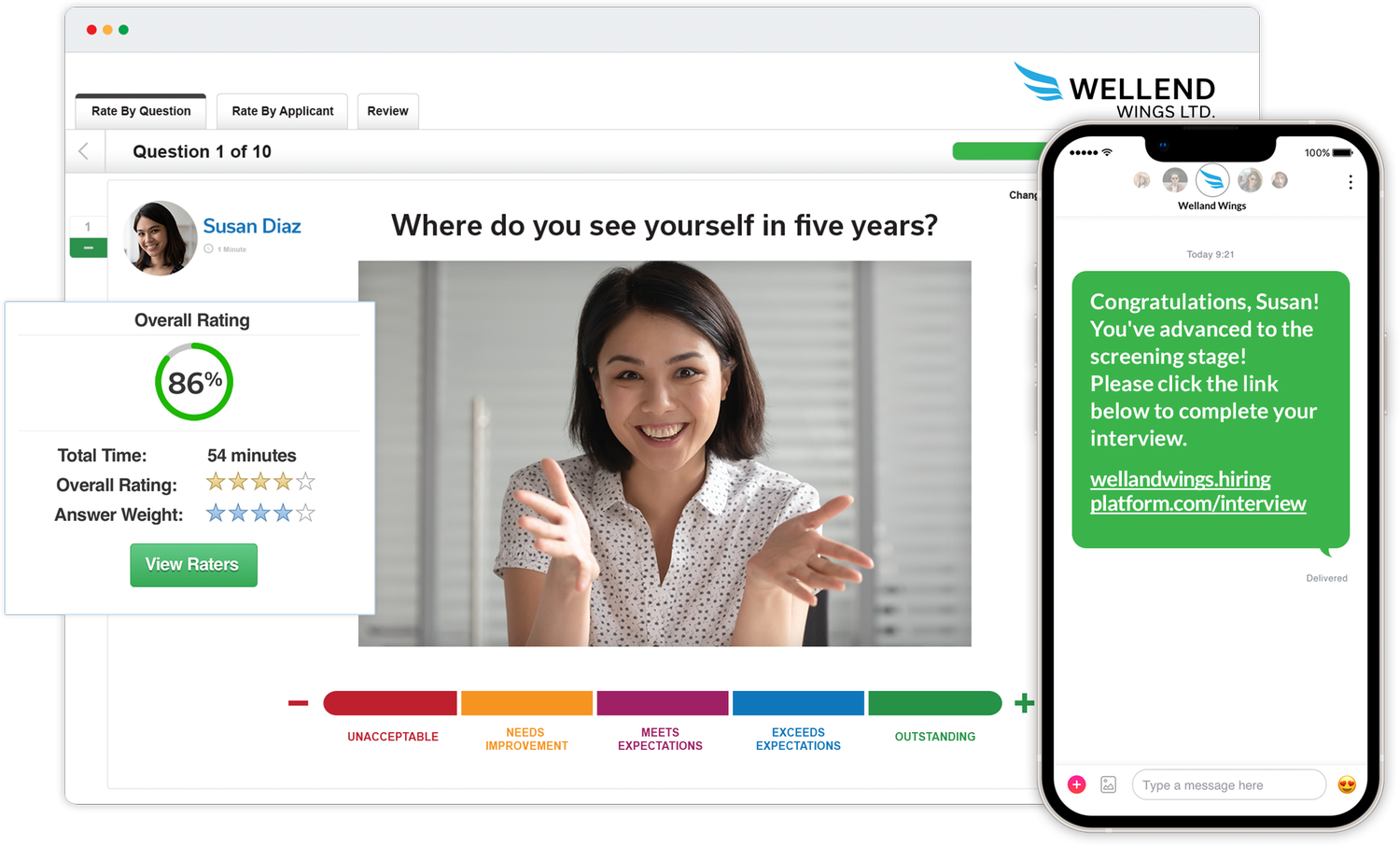
5. Willo
Best for: Teams prioritizing a polished candidate experience for one-way interviews with lightweight collaboration.
What it does: Async video questions, branded invitations, simple reviewer workflows.
Pricing: Tiered by jobs, seats, or volume — confirm what counts as usage.
ATS: Often via Zapier or webhooks — confirm native vs. workflow-based support.
Setup: 30–90 minutes.
Tradeoffs: Candidate-friendly UX and fast adoption. May outgrow if you need deeper AI or governance.
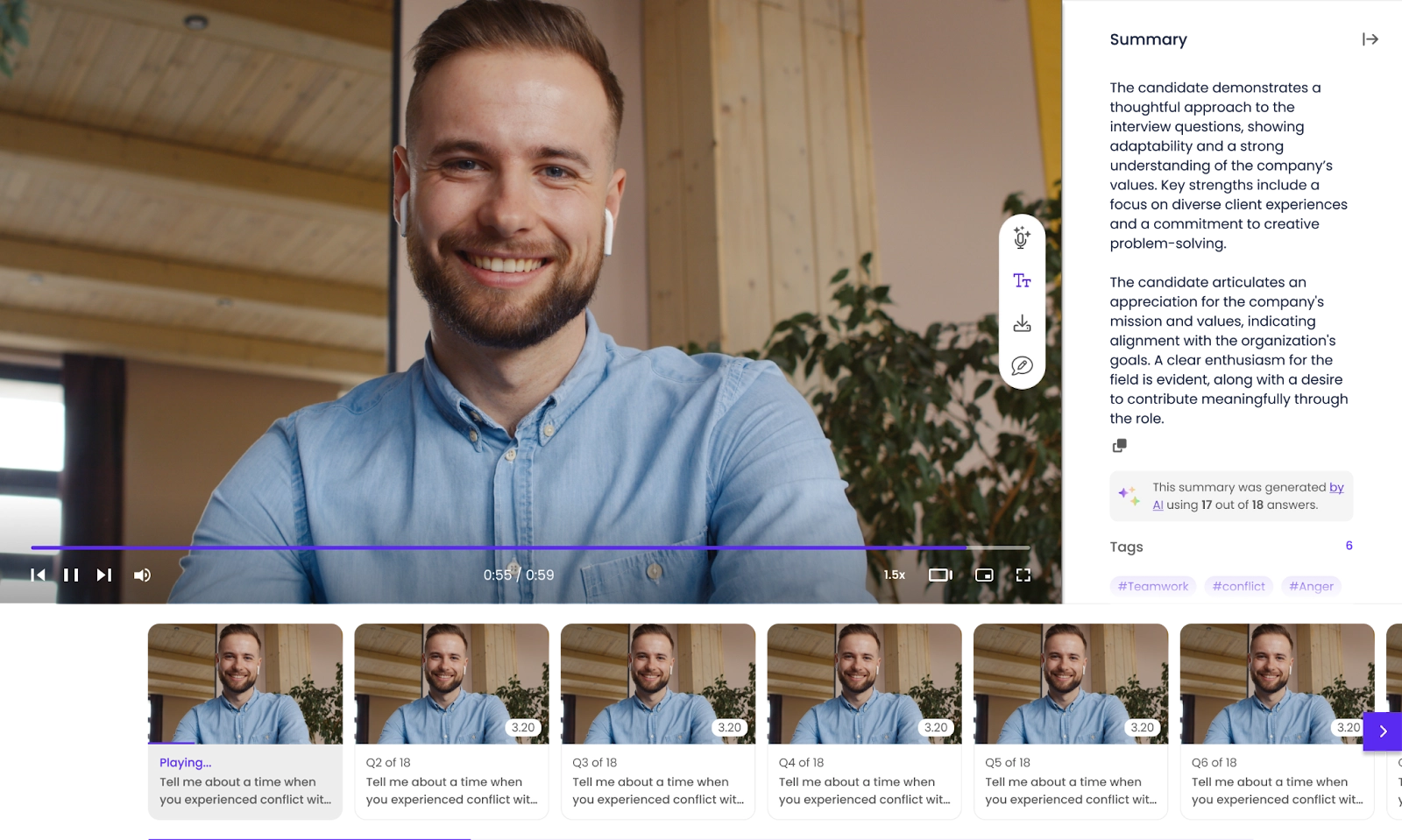
6. myInterview
Best for: Small HR teams hiring across many roles who want approachable video screening.
What it does: One-way responses, easy sharing, lightweight review.
Pricing: Transparent tiers — confirm caps on active jobs, team members, or monthly volume.
ATS: Commonly link-based or automation-driven — confirm whether results write back automatically.
Setup: 15–60 minutes.
Tradeoffs: Easy rollout for hourly and generalist roles. Less depth in structured scoring and analytics.
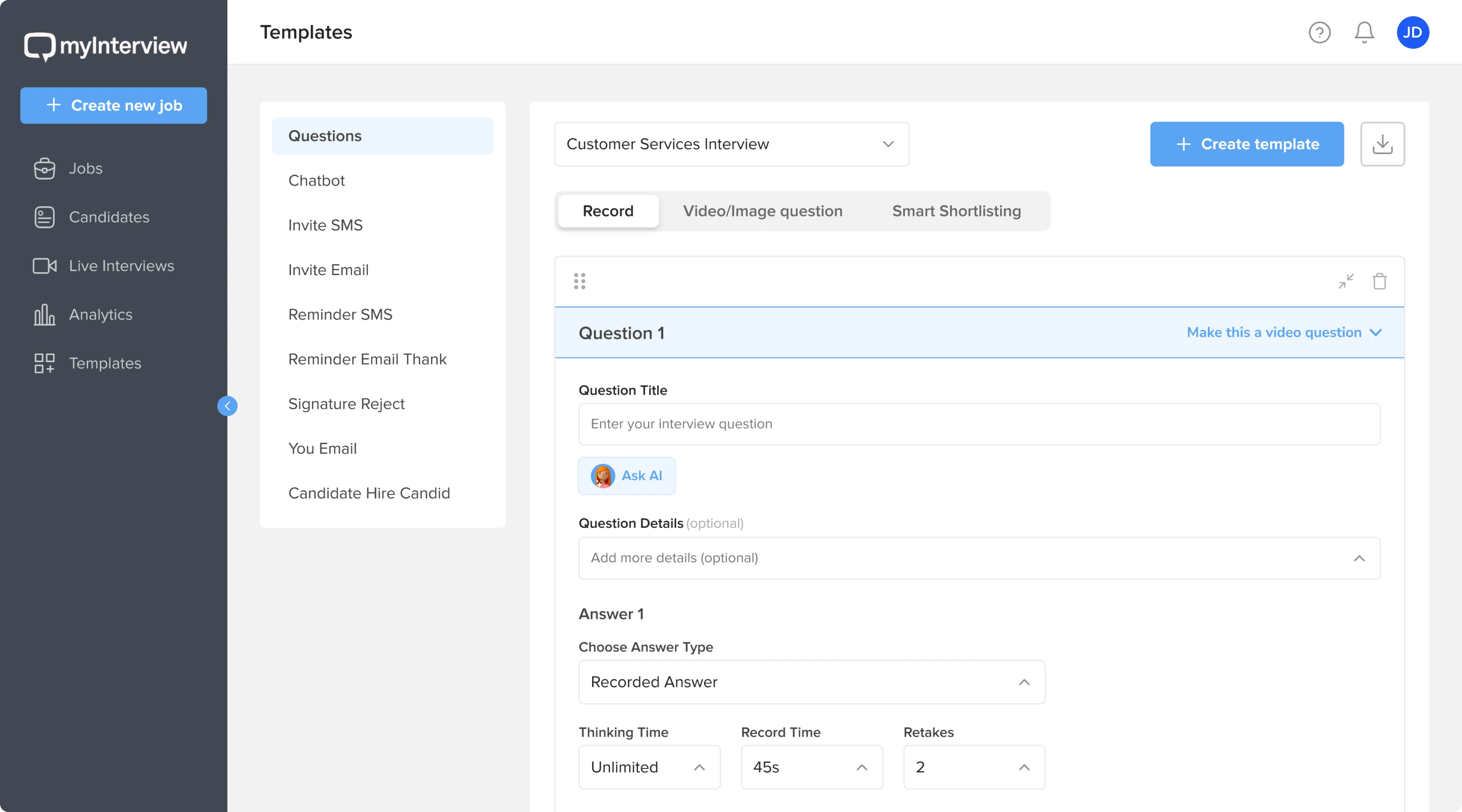
7. interviewstream
Best for: Teams needing broader interviewing with emphasis on structured, repeatable processes.
What it does: Digital interviewing plus workflows to standardize evaluation and documentation.
Pricing: Quote-based; tied to size, modules, and support.
ATS: Varies by ATS and package — define stages, attachments, fields, and feedback visibility up front.
Setup: 2–8 weeks.
Tradeoffs: Good for governed processes and consistency. Slower to implement than self-serve tools.
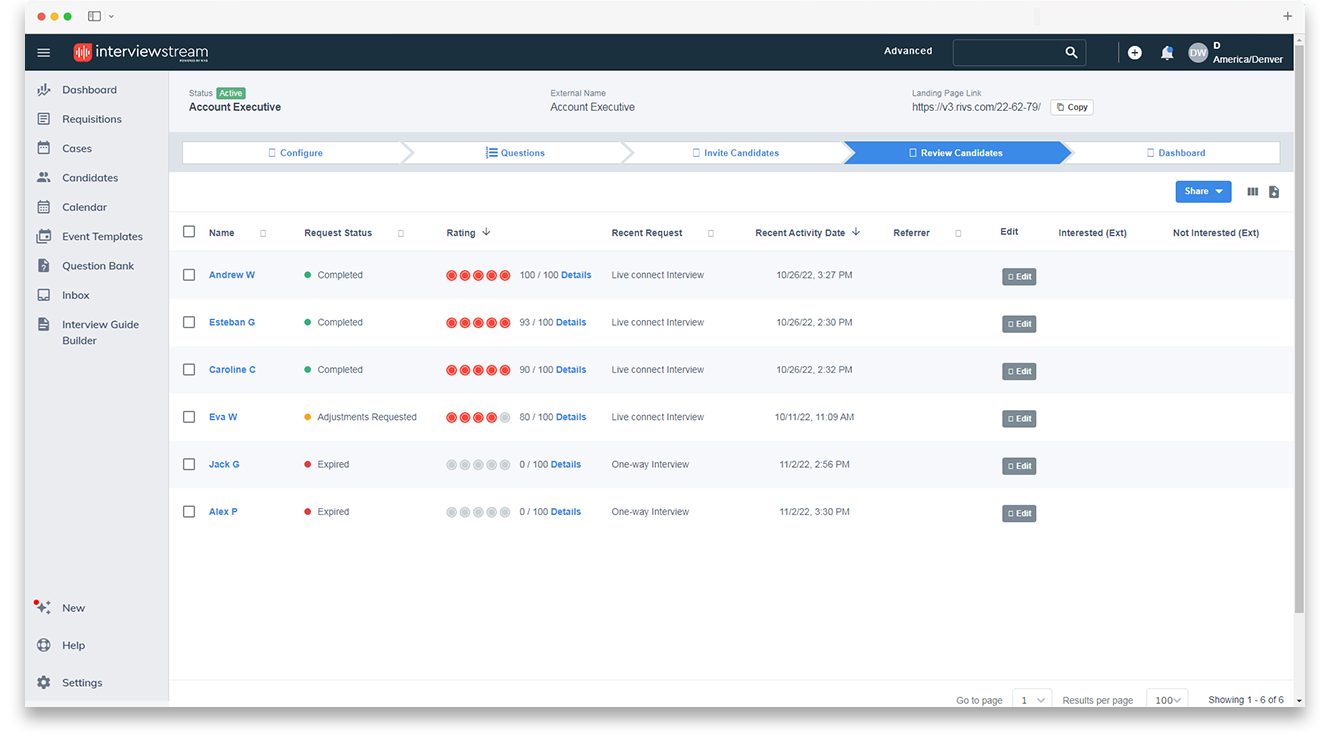
8. Jobma
Best for: Volume teams wanting one-way interviews and supporting features without full enterprise suites.
What it does: Async interviews, collaboration, and workflow utilities for volume hiring.
Pricing: Jobma is subscription-based — confirm whether you pay per seat, per job, or per interview, and how seasonal spikes are handled.
ATS: Often positioned with ATS connectivity — confirm native, partner-built, Zapier, or API for your specific system.
Setup: 1–5 days.
Tradeoffs: Strong value for volume. UI and evaluation depth vary by module.
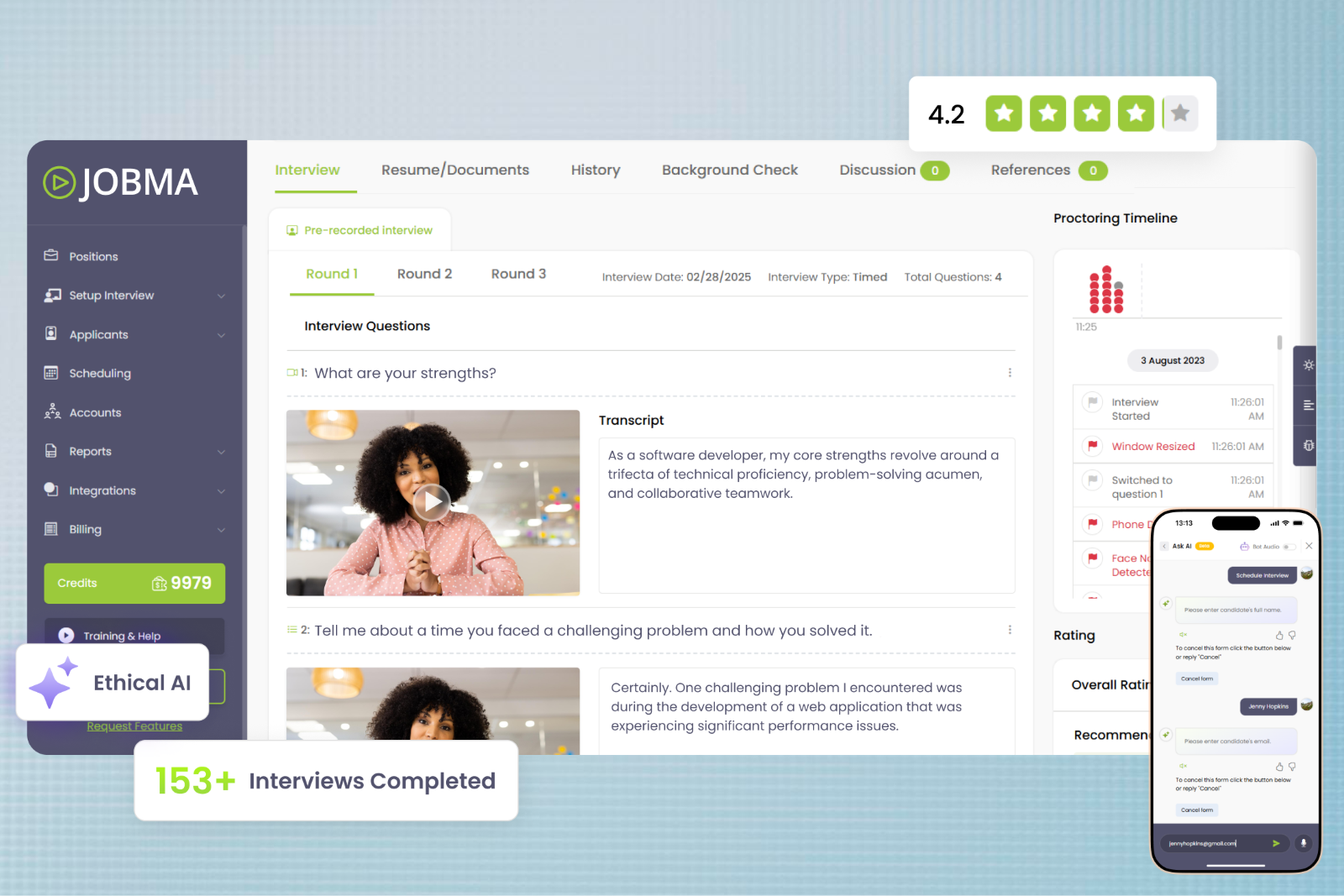
9. Hireflix
Best for: Teams that want a clean, focused one-way tool and already use structured rubrics externally.
What it does: Async interview creation, question libraries, team review, simple workflows.
Pricing: Straightforward subscriptions — confirm collaborator seats and usage caps.
ATS: Often via links and automations — confirm API, Zapier, or webhooks for automatic sync.
Setup: 15–45 minutes.
Tradeoffs: Fast adoption and low overhead. Teams wanting AI-generated summaries and scoring may prefer more feature-rich platforms.
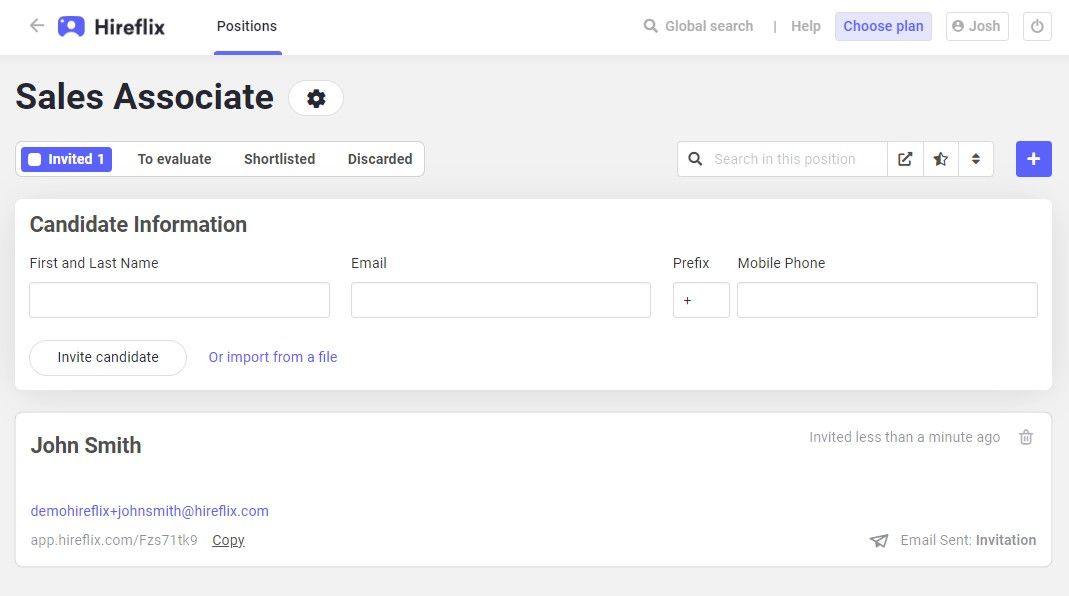
ATS integrations for video interview tools: What to verify before you sign
This is where buying decisions go wrong. "We integrate with your ATS" can mean real-time bi-directional sync or a pasted link. Confirm the actual video interview integration workflow for your ATS before you commit.
Four handoffs to validate:
- Invite trigger: Does an ATS stage change automatically send the interview invite — or does a recruiter do it manually?
- Completion sync: Does the candidate's completion status update in the ATS in real-time?
- Results write-back: Do transcripts, scores, summaries, and interview links land in the ATS candidate profile — in structured fields, not just a note?
- Disposition sync: Do rejection reasons and archive status sync back for reporting and compliance?
Also confirm: who owns the connector (vendor, middleware, or you), what the SLA is when it breaks, and what happens during ATS updates or API changes.
The real test: ask any vendor to show you a completed candidate record in your ATS after an interview. If they can't demo the synced fields in 10 minutes, expect manual work.
If you're on Greenhouse, Lever, or Workable: Ask specifically about invite-on-stage-change, where artifacts (transcripts, scores, video links) live in the candidate profile, and whether reviewers can stay in the ATS or need to switch to the vendor's platform.
How to choose the right video interviewing tools
You're not buying a video interview tool: You're buying a faster, more consistent candidate screening workflow. Use this to go from evaluation to live candidates in a week.
Step 1: Match the format to your bottleneck
If phone screens are the bottleneck (high volume, scheduling chaos, inconsistent evaluation), start with async one-way interviews. If final-round coordination is the problem (panels, time zones, stakeholder alignment), prioritize live with strong scheduling. Most teams need async first — that's where the biggest time savings are.
Step 2: Standardize your evaluation
The tool matters less than the process. Build a rubric with 4–6 criteria per role family, each with clear scoring anchors (not just 1–5 with no definitions). Standardized rubrics cut second-guessing and make reviewer calibration fast — often a 30-minute session is enough.
Step 3: Validate ATS integration for your specific workflow
Use the four-handoff checklist above. Run one real requisition through the full loop before you go live with candidates: stage change → invite sent → candidate completes → reviewer sees results → ATS record updates. If it breaks in testing, it'll break at volume.
Step 4: Design questions that surface real signal
Ask for examples, tradeoffs, and constraints — not hypotheticals. "Tell me about a time you had to handle an upset customer with no manager available" beats "How would you handle a difficult customer?" every time. Keep it tight: 4–6 questions, 1–2 minutes per answer, with enough prep time that candidates aren't blindsided.
Step 5: Pilot one role for two weeks
Pick a high-volume, repeatable role. Track completion rate (are candidates finishing?), time to review (how long per candidate?), and whether the shortlist quality holds up when you move candidates to live interviews. If the numbers work, roll the playbook to the next role. If they don't, adjust question length, clarity, or reminders before scaling.
Step 6: Use AI as decision support, not the decision
AI can transcribe, summarize, and surface match signals. Treat it as a thorough note-taker — it helps you review faster, but you're still watching videos and making every advancement decision. Every score should include reasoning you can evaluate yourself.
Pricing: ranges and models for 2026
Video interview software pricing falls into two lanes:
Self-serve / SMB tools typically run from around $99/month to a few hundred per month. These are built for speed — you sign up, build an interview, and go live the same day.
Examples: Truffle at $99/month (annual), Spark Hire with subscription tiers starting around $299/month.
Enterprise suites start in the tens of thousands per year and scale from there with volume, modules, professional services, and compliance workstreams. Examples: HireVue and VidCruiter with quote-based enterprise packages. Factor in implementation, multi-region rollout, and recurring compliance costs in your TCO.
Pricing models and what to watch for
- Per-user: Predictable for stable teams, but can penalize collaboration if adding reviewers costs extra. Ask whether hiring managers count as seats.
- Per-interview or per-candidate: Good for seasonal spikes and variable volume. Risky if volume surges as a busy month can blow your budget. Confirm how "interview" is defined (started vs. completed) and whether retakes count.
- Unlimited / flat-rate: Best for consistent high volume. Check for fair-use caps, storage limits, and whether "unlimited" applies to jobs, candidates, users, or all three.
- Per-job: You pay for each active job posting with interviews enabled. Good if you hire for a few roles at a time; expensive if you run many concurrent requisitions.
What to ask before you buy video screening tools
Feature gating: Which capabilities are included at your tier and which cost extra? Common upsells: ATS write-back, AI-generated summaries and scores, branded experiences, SSO, analytics, and premium support.
Implementation fees: Self-serve tools usually have none. Enterprise platforms may charge for onboarding, configuration, integration build, and training. Get a number, not "we'll scope it."
Overage pricing: What happens when you exceed your plan's volume — per-interview charges, automatic tier upgrades, or throttling?
Contract terms: Monthly vs. annual commitment, cancellation terms, and what happens to your data (recordings, transcripts, scores) if you leave.
Total cost of ownership: Beyond the license, factor in integration maintenance, internal admin time, compliance workstreams (if AI evaluation triggers regulatory requirements in your jurisdiction), and the cost of scaling to additional roles and locations.
The cheapest tool isn't always the best deal. A platform that costs more but gets you from applicant to shortlist in a day — with clean ATS data and structured evaluation — often pays for itself in recruiter hours within the first month.

